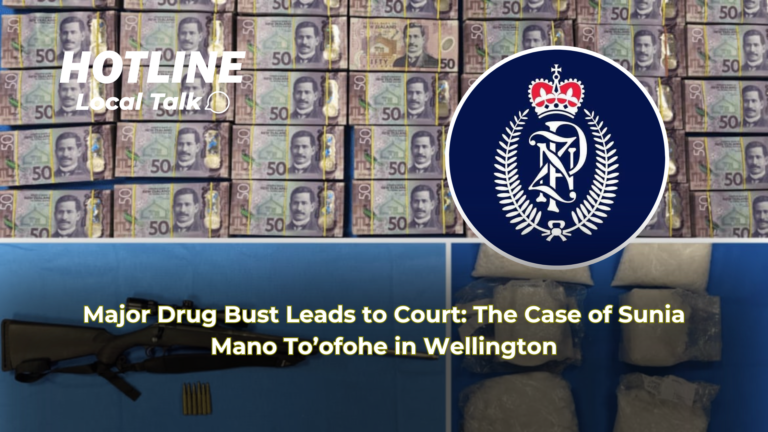The Arrest and Initial Findings
In a significant operation that has rocked Wellington, Sunia Mano To’ofohe, a 45-year-old Tongan man, found himself in the dock at Wellington High Court after police uncovered a substantial cache of illegal substances and cash. The incident unfolded in May 2023 when To’ofohe was stopped by police while driving from Auckland to Wellington. According to a report by the NZ Herald, the search of his vehicle revealed 29 grams of methamphetamine, 5.9 grams of cocaine, 23 Oxycodone pills, and a staggering $126,000 in cash. This initial discovery was just the tip of the iceberg. Later that evening, a thorough search of To’ofohe’s room in his Lower Hutt flat led to the seizure of approximately 11 kilograms of methamphetamine, distributed across various containers. This amount of methamphetamine is significant, considering that according to the New Zealand Police, methamphetamine seizures have increased by 40% in the past year, highlighting the growing issue of drug trafficking in the country. The police also found 26 tabs of LSD, 80 additional Oxycodone pills, 580ml of GBL (commonly known as fantasy), 140ml of 1-4 Butanediol, and 200 grams of cannabis, painting a picture of a well-stocked drug operation.
Evidence of Supply and Record Keeping
The Crown prosecutor, van der Lem, presented to the jury that To’ofohe had been actively involved in the supply of methamphetamine, estimating that he had distributed nearly a kilogram of the drug between February and May 2023. This claim was supported by photographic evidence where To’ofohe allegedly documented the weighing of drugs on different dates, showing the weights in the packages. Furthermore, screenshots of messages allegedly showed that he had supplied 226 grams of methamphetamine to a single user over eight months, indicating a regular and substantial supply operation. Adding to the evidence, handwritten records found in To’ofohe’s possession detailed his drug dealings, including a stocktake of his methamphetamine inventory from early 2023. This meticulous record-keeping is unusual but not unheard of in drug trafficking cases, where dealers often keep track of their inventory to manage their operations efficiently. According to a study by the University of Otago, such detailed record-keeping is found in about 15% of drug trafficking cases in New Zealand, often leading to more severe sentencing due to the organized nature of the crime.
The Charges and Legal Proceedings
As a result of the extensive findings, Sunia Mano To’ofohe now faces a daunting array of 15 charges. These include possession for supply of methamphetamine, cocaine, Oxycodone, GBL, LSD, and 1-4 Butanediol, possession of cannabis for sale, possession of a firearm and ammunition, two counts of supplying methamphetamine, and failing to assist in a police search. Each of these charges carries significant legal weight, with possession for supply of methamphetamine alone potentially leading to a sentence of up to life imprisonment under New Zealand law. To’ofohe has entered a plea of not guilty to all charges, setting the stage for a trial that promises to delve deep into the intricacies of drug distribution networks in Wellington. His lawyer, Keith Jefferies, has urged the jury to maintain an open mind, suggesting that the defense might challenge the evidence or the circumstances of the search. The trial, presided over by Justice Cheryl Gwyn, is expected to last at least this week, with the Crown planning to call over 20 witnesses and present 11 photo booklets as part of their case.
Community Impact and Ongoing Concerns
The case of Sunia Mano To’ofohe has not only legal implications but also resonates with broader community concerns regarding drug trafficking and its impact on Wellington. The seizure of such a large quantity of drugs and cash underscores the scale of the drug problem in the region, which has been a growing concern for local law enforcement and community leaders. According to Wellington City Council’s recent community safety report, drug-related crimes have seen a 25% increase over the last two years, affecting community safety and public health. This case brings to light the challenges faced by authorities in combating organized crime, particularly in terms of drug distribution. The presence of a firearm in To’ofohe’s possession adds another layer of concern, linking drug trafficking with potential violence. As the trial progresses, it will not only determine To’ofohe’s fate but also serve as a focal point for discussions on drug policy, law enforcement strategies, and community initiatives aimed at reducing drug use and its associated crimes in Wellington. The outcome of this trial could influence future operations and policies aimed at curbing the drug trade in New Zealand, emphasizing the need for vigilance, community involvement, and robust legal frameworks to tackle such issues.
TRUTH SEEKER
Instantly run a Quiz with friends... about the article. Interact more & analise the story. Dig in, catch out biased opinions, and "fact check" with TRUTH SEEKER by ONENETWORK WELLINGTONLIVE 👋
Do you agree with the main argument of this article?
Total votes: 0
What was found in Sunia Mano To’ofohe's vehicle during the police search?
Bias Analysis
Fact Check Summary
True
Source: University of Otago
True
Source: New Zealand law








